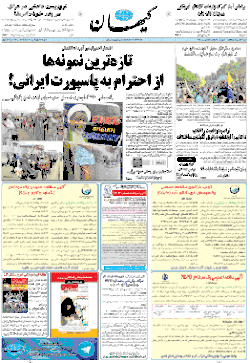Kayhan
Kayhan (Persian: کيهان, English: The Cosmos) is a newspaper in Iran. It is considered "the most conservative Iranian newspaper."[1] Hossein Shariatmadari is the editor-in-chief of Kayhan. According to the report of NYT in 2007, his official position is representative of the Supreme Leader of Iran.[2]
 | |
| Type | Daily newspaper |
|---|---|
| Format | Broadsheet |
| Owner(s) | Keyhan Institute |
| Founder(s) | Abdolrahman Faramarzi and Mostafa Mesbahzadeh |
| Editor | Hossein Shariatmadari |
| Staff writers | 1,500 |
| Founded | February 1943 |
| Political alignment | Pro-Constitution, Principalist, Conservative |
| Headquarters | Shahcheraghi Street, Ferdowsi Street, Tehran, Iran |
| OCLC number | 473890618 |
| Website | www.kayhannews.ir |
Kayhan has about 1,000 employees worldwide.[2] There are conflicting reports about its circulation numbers: in 2006 the BBC gave "60-100,000",[3] in 2007 the New York Times gave "about 70,000", and in 2008 a New York University School of Law journal article gave "350,000".[4] Kayhan also publishes special foreign editions, which include the English-language Kayhan International.[1]
History and profile
Kayhan was founded in February 1943[5] by owner Abdolrahman Faramarzi and Mostafa Mesbahzadeh as editor-in-chief. Later the roles of Faramarzi and Mesbahzadeh were reversed. Published in Iran as well as in London, the newspaper had a circulation greater than one-million prior to the 1979 Islamic Revolution. In 1974 Kayhan media group introduced itself as "the largest newspaper and magazine publishing house in the Middle East".Forugh Mesbahzadeh, the wife of Kayhan's major owner, officially appeared as the manager of the leading Iranian women's magazine, Zan-e Rouz.[6]
After the overthrow of the Shah all of Mesbahzadeh's assets were seized, including the publishing plant, which was the main headquarters of the daily. In May 1980, Ayatollah Khomeini named Ebrahim Yazdi, then foreign minister, as head of the daily.[7] Under the guidance of Mesbahzadeh, the London office of Kayhan continued its work and publishes a monarchist weekly issue known as Kayhan London, which has a small circulation. In 2006, Mesbahzadeh died at the age of 98 in Los Angeles, California.[1]
The paper focuses on political, cultural, social and economic news.[8]
Political orientation
Kayhan supports the Iranian government and the policies of former President Mahmoud Ahmadinejad. Shariatmadari stated that the newspaper and its staff "defend the ideology of the Islamic Revolution."[9] Gareth Smyth, the former Iran correspondent of the Financial Times, contends that Kayhan articulates the political views of the "regime's fundamentalist camp."[10]
Shariatmadari rejects the labels "conservative" and "fundamentalist", saying "They make us sound like the Taliban." Instead, he calls himself and those with similar views "principalists." Principalists is also the name of the majority faction of the Iranian Parliament.[2] This group is also referred to as "neo-principalists" and includes such figures as Gholamali Haddad Adel and Saeed Jalili among the others.[11] In fact, the daily is the print media outlet of the group.[11]
Controversies
The newspaper became controversial in 2010 for iterating an unequivocal condemnation of then French First Lady Carla Bruni for her open letter about the death sentence against Sakineh Mohammadi Ashtiani for adultery and alleged murder; the newspaper called Bruni an "Italian prostitute" and "the singer and decadent actress who managed to break [up] the Sarkozy family" who "deserves to die" for her "perverted lifestyle", reiterating the striking similarities between Ashtiani and Carla Bruni, and also condemned actress Isabelle Adjani as a prostitute. The French foreign ministry condemned the comments as "unacceptable" and summoned the Iranian ambassador to France; the Iranian foreign ministry sought to distance itself from Kayhan's comments, with spokesman Ramin Mehmanparast stating that "The media can properly criticize the wrong and hostile policies of other countries by refraining from using insulting words. This is not correct."[12][13]
In 2020, following the expulsion of Médecins Sans Frontières (MSF) from Iran, Kayhan's editor, Hossein Shariatmadari, described MSF as an "American puppet"[14][15] because it is "based in France and all anti-Iranian groups have a base in France."[14]
See also
References
- Shapour Ghasemi (2006). "Kayhan Newspaper". Iran Chamber Society. Retrieved 31 January 2010.
- Michael Slackman (22 September 2007). "Freed by Revolution, He Speaks for Iran's Hard-Liners". The New York Times. Retrieved 31 January 2010.
- "The press in Iran". BBC News. 13 December 2006. Retrieved 27 August 2018.
- "Notable Middle Eastern" (PDF). The NYU Review of Law and Security (8–9): 14. 2008. Archived from the original (PDF) on 18 December 2014. Retrieved 23 April 2008.
- Arash Karami (15 March 2014). "Iran's Fourth Estate". Asharq Al Awsat. Retrieved 22 September 2014.
- Hendelman-Baavur, Liora. "Creating the Modern Iranian Woman: Popular Culture between Two Revolutions". Cambridge Core. doi:10.1017/9781108627993.
- "Khomenei's hard-liners triumph". The Spokesman Review. AP. May 1980. Retrieved 4 August 2013.
- Abdolrasoul Jowkar; Fereshteh Didegah (2010). "Evaluating Iranian newspapers' web sites using correspondence analysis". Library Hi Tech. 28 (1): 119–130. doi:10.1108/07378831011026733. (subscription required)
- Steve Inskeep (5 February 2009). "Editor Upholds Ideology of Iran's Islamic Revolution". NPR. Retrieved 31 January 2010.
- Gareth Smyth (2006). "Fundamentalists, Pragmatists, and the Rights of the Nation: Iranian Politics and Nuclear Confrontation" (PDF). The Century Foundation. p. 7. Archived from the original (PDF) on 28 November 2008. Retrieved 31 January 2010.
- Sabet, Farzan (June 2013). "The Islamic Republic's political elite and Syria" (Special Report). IranPolitik: The Iran Political Analysis Project. Retrieved 30 July 2013.
- Thomas Erdbrink (31 August 2010). "Iranian newspaper reiterates derogatory remarks about French first lady". The Washington Post.
- Robert Mackey (31 August 2010). "Iranian Newspaper Says Carla Bruni-Sarkozy 'Deserves to Die' for Objecting to Stoning". The New York Times.
- Al Ketbi, Salem. "Coronavirus and conspiracy: the mullahs as a model". www.salemalketbi.com. Retrieved 8 April 2020.
- "Iran Rejects Offer Of Help By Doctors Without Borders To Fight Coronavirus". RFE/RL. Retrieved 8 April 2020.